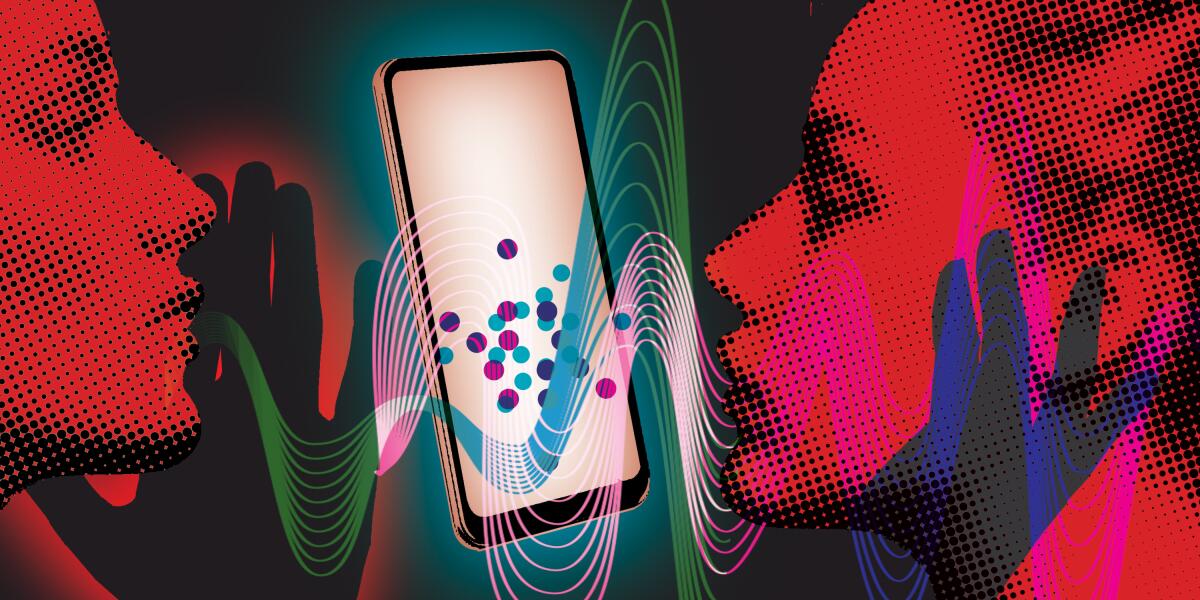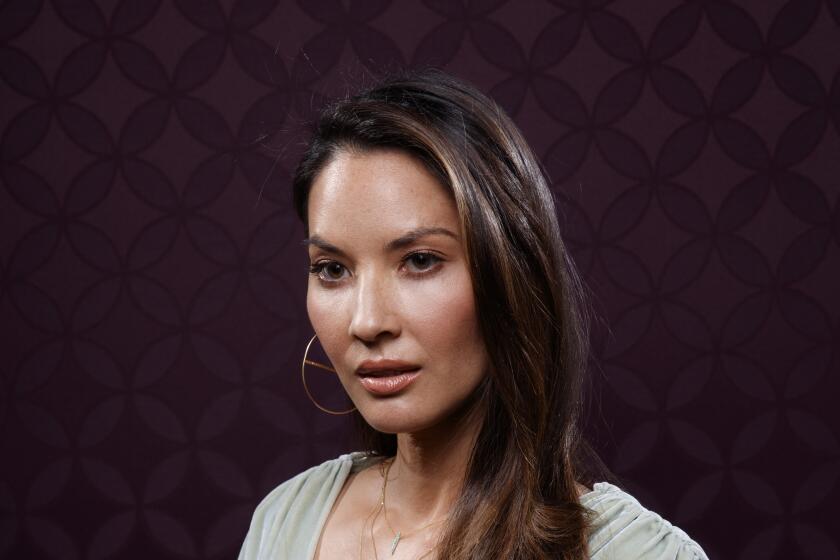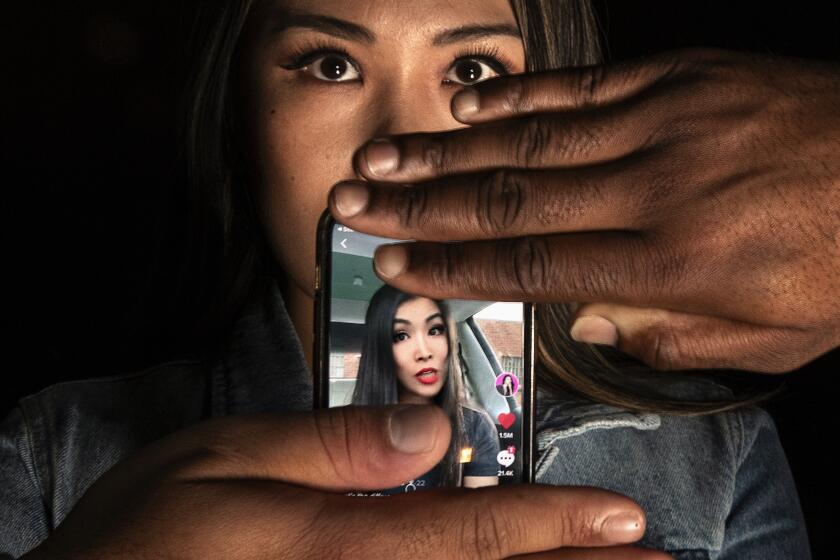Going Blind: From TikTok to Podcasts, Blind Items Are Taking Over (Again)

- Share via
“A-list comedian/‘actress’ has a new show and it’s time people know how awful she is.” This anonymous, potentially incendiary clue is just one of the hundreds of notes the Instagram account Deuxmoi receives in a day.
“I have a full-time job, so I do this in the time that I’m not at work,” the account’s curator says over Zoom with her camera off. “It’s very insular. Everything’s on my phone. I just wake up, I check all the socials, I check my email. It’s a 24/7 thing, seven days a week, however-many-hours-I’m-awake-in-a-day thing. … There’s nothing glamorous about it. It’s just me basically on my phone all day.”
Described as the “modern-day Gossip Girl,” Deuxmoi is an Instagram account run by an anonymous content creator who curates reader-submitted bits of celebrity chatter that oscillate between blind items — a rumor with context clues but no names — and unverified updates where the senders’ identities are anonymous but the famous individuals’ are not. Initially gathering steam at the onset of the pandemic, Deuxmoi has since expanded to more than 1 million followers, while its mysterious creator has been recognized by major media outlets ranging from Vanity Fair to the “Today” show. It would be fair to say that, at this point, Deuxmoi is itself a celebrity — and has helped birth a new wave of interest in Hollywood blind-item culture.
More recently, Deuxmoi has launched a podcast and has its own (unaffiliated) Subreddit forum where readers dissect high-profile scuttlebutt — both anonymous and not — that surfaces on the account. This new advent of blind-item interest is hardly limited to Deuxmoi: Blinds are trickling onto myriad media platforms, from Instagram, where Deuxmoi reigns, to podcasts and TikTok accounts. For instance, a creator called @skinfluencebymsk recently broke down the unsubstantiated claim that Ariana Grande had a secret affair with Jimmy Fallon. Other accounts attempt to piece together the love interests who’ve inspired Taylor Swift songs, while other creators purport to deconstruct whether or not Swift ever had a romantic relationship with supermodel Karlie Kloss. The content is truly bottomless. Another TikTok creator breaks down a rumor that Harry Styles’ team is quietly deleting unfavorable articles about the singer, and another points out how a blind about Elon Musk separating from Grimes was, in fact, true.
One of TikTok’s most followed blind-item experts is a creator named Shannon McNamara, who posts under the name @FluentlyForward. On a near-daily basis, McNamara digs through blind-item archives, with many of her videos answering questions sent in by viewers asking her to talk about the blind-item history of their celebrity of choice. For example, when news broke that Lisa Bonet and Jason Momoa were divorcing, McNamara resurfaced an old video breaking down the blinds around the “Aquaman” star. Other times, she’ll recount the blind-item history of famous celebrity couples, such as the recently public Bill Hader and Anna Kendrick, or talk about celebrities who have no incriminating blind items whatsoever (Emma Stone, Zendaya).
“I had just been reading blind-item websites for maybe six years,” McNamara says, name-checking the long-running blind-item blog Crazy Days and Nights. “I just kind of amassed this knowledge of the inside story of everything that’s happening in Hollywood by checking this website every day. I remember I saw a blind item about Addison Rae on one of the websites, so I made a TikTok about it, like, ‘Ooh, has anyone else seen this? Let’s talk about it.’ And the response was one I wasn’t expecting. People were saying, ‘What the hell is a blind item?’ So that led into this series of explaining what a blind item is.”
Today’s new media platforms seem to be introducing blind items as a source of entertainment to an entirely new generation, but they actually date back to the Gilded Age, when William d’Alton Mann, publisher of a New York City magazine called Town Topics, used them as a form of blackmail. In the ’90s, the blind item enjoyed a renaissance in juicy celebrity columns like Page Six and the Village Voice, which published anonymous, unconfirmed bits of gossip concerning the rich and famous that would be sure to get readers talking while the publication itself could steer clear of any potential lawsuits.
To give you an idea of how a classic, “Jeopardy!”-style blind could be formatted, former Voice columnist Michael Musto recounted a few of his favorites in a column for Town & Country: “What late star’s husband went home with a female impersonator dressed as his dead wife?” “What three uptown dames were all Madam Alex prosties who became socialites by marrying their wealthy johns?” And “What actor started that gerbil rumor about that other actor out of rivalry?”
In the 2000s, the blind item found new life online via blogs like the aforementioned Crazy Days and Nights (run by an anonymous entertainment lawyer) and Lainey Gossip, run by Canadian TV personality Elaine “Lainey” Lui. Websites like these served as a direct inspiration for a new generation of blind-item content creators such as McNamara, Deuxmoi, fellow Instagram user @Diet_Prada and creators like Kelli Williams and Troy McEady, who host the podcast “Beyond the Blinds.”
As far as this decade goes, Williams cites the launch of Deuxmoi as a major jumping-off point in terms of widespread blind-item interest in the 2020s. “That’s when people started being like, ‘What is a blind item? This is exciting stuff. How can we learn more?’” says Williams. “Before that, you talk about a billionaire who somehow has a private island and flies really important people to it. And people are like, ‘What are you talking about?’”
Indeed, for all of their fun and froth, blind items have a dark side to them. Prior to the #MeToo movement, blind items could be a frequent source of unverified information hinting at predatory behavior in the entertainment industry. Regarding the now-disgraced movie producer Harvey Weinstein, a 2016 item on Crazy Days and Nights reads, “Her career could have crashed and burned when she refused the legendary advances of this producer/mogul. He threatened to destroy her career but she found a mentor who actually is not afraid to go to war with the mogul and the mogul backed down.”
On her TikTok account, McNamara sifts through the blind-item archives to piece together warning signs surrounding infamous predators, such as Weinstein and the late Jeffrey Epstein. Other times, she’ll recount a history of incriminating blind items surrounding celebrities who have not faced a public scandal but are still rumored to engage in predatory behavior. “There’s all of these rock star musicians who have been allegedly having sex with all of these underage groupies,” she says. “I mean, there must be over 300 [allegations]. .
The cultural need touncover scandalous behavior may also have connections to zeitgeisty trends like true crime and even the ongoing rise in conspiracy theories. Last year, TikTok blew up with true crime enthusiasts attempting to hunt down Brian Laundrie after the suspected murder of his girlfriend Gabby Petito. The case became a national obsession, with TikTok creators frequently jumping on that and similar apps to share and debunk theories and clues about her disappearance. You also can’t go on TV streaming platforms without running into hours upon hours of true-crime programming, which arguably took off in the wake of the podcast “Serial.”
McNamara cautions against lumping politically driven conspiracy theories in with blind items, but she does understand how the two could be conflated in a mainstream sense. “It’s a lot easier to say ‘conspiracy theory’ than it is to say ‘pop culture hunch,’” she concedes. “But it’s interesting because when we hear about pop culture, you’re really just getting PR fluff pieces. It’s crazy that someone would buy a People magazine just to be fed PR. No celebrity, for the most part, is going to talk about the bad things that are going on. And, of course, some of these blind items are absolutely insane, and some of these rumors are just rumors, but it’s also crazy that the divorce rate is so high in Hollywood, but ‘no one’s cheating,’ because no one’s gonna say it. So I feel like enough things do eventually come to a head and bubble up. Honestly, you just have to be kind of stupid to think that there’s nothing else going on.”
In other instances, blind-item culture can boil down to needing validation about a gut feeling. If you’re inclined to like a celebrity, a positive blind item can reinforce goodwill. Other times, the opposite is true. “Troy and I always say, ‘Not every blind item is true,’” Williams says. “Say someone doesn’t like Taylor Swift, and they see a blind that says she’s mean. They’re going to believe that one. But if they’re an Ariana Grande fan, they won’t believe a bad one about her.”
The creator behind Deuxmoi also warns that, when it comes to TikTok and message boards, it can be extremely easy for a rumor to take on a life of its own. “I see a lot of these TikTok accounts reporting things that I believe to be conspiracy theories, and they’re reporting them like news,” she says. “You have to be careful of that. I think that because I had experience reading blind items before I started the account, that helped me a little bit. But I’ve also had to learn along the way. There’s also a lot of fandom theories and a lot of fan fiction that fans will submit as current-day gossip.
“It’s almost like the Mandela effect,” she adds. “People will hear something not knowing where it originated and start to think it’s true. For example, Chris Evans dating Selena Gomez. That started on TikTok, and it spun out of control.”
Ultimately, though, the Deuxmoi creator thinks blind items will always be a popular source of entertainment, for the basic fact that people like a good puzzle. “It’s like a riddle,” she says. “You have to solve the riddle. It’s fun for them. Almost like how you do a crossword puzzle.”
“To be honest, when we started the podcast, we didn’t think anyone would care to listen,” Williams says. “We were really shocked that people were so invested. I think it’s just gonna make PR work overtime.”
More to Read
The biggest entertainment stories
Get our big stories about Hollywood, film, television, music, arts, culture and more right in your inbox as soon as they publish.
You may occasionally receive promotional content from the Los Angeles Times.












